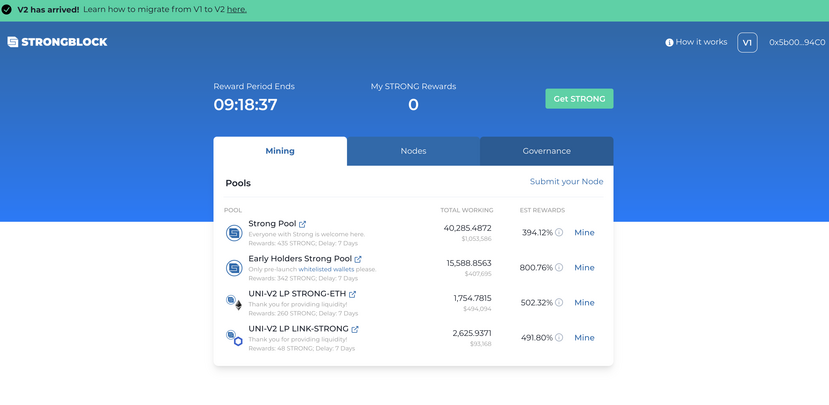Enterprise blockchains are going mainstream. With giants like IBM and Oracle expanding into space, more and more corporations adjust their strategy to trust and transparency that can be achieved with decentralised ledgers.
Blockchain as a Service, also known as BaaS, is a cloud-based service and infrastructure where instead of building the decentralised network in-house the customer relies on a service provider. Considering the large deficit of blockchain development experts and the potential risks companies frequently choose BaaS over their own infrastructure.
According to the 2nd Global Enterprise Blockchain Benchmarking Study published by Cambridge University last year more than 80% of enterprise blockchains are highly centralized. The reason behind this is the lack of sophisticated governance and compensation for independent nodes, according to David Moss, Founder and CEO of StrongBlock. David started his career at Oracle Corporation, as a consultant and developer. He became a technology executive at several prominent companies, including Edmunds.com, the top US automotive site, where he was the founding CIO.
.jpeg) David Moss
David Moss
In the blockchain industry, David was the second employee in the United States for Block.one LLC, where he was in charge of building out and delivering EOSIO. He also led the launch of the EOS mainnet in June 2018.
BitCourier sat down with Mr. Moss to discuss StrongBlock's newest DeFi protocol and their strategy of moving the BaaS industry forward.
BitCourier: What prompted the creation of the StrongBlock?
David Moss: The core team that I worked with at Block.one LLC were all former colleagues of mine. Together we had built several other massive projects. So after delivering EOSIO, we were allowed to leave together as a team to form StrongBlock and build out a Blockchain-as-a-Service (BaaS) platform.
BitCourier: What target user did you have in mind? Did you focus on enterprises or individuals at first?
David Moss: The BaaS platform was designed for both individuals and Enterprises. We made it super-easy to configure and set up a blockchain and create applications. The total time was just a few minutes. That was great for anyone who wanted to get started with their own blockchain. For individuals, they were able to get a small blockchain application up and running in a short time. For Enterprises, they liked that they could set up a prototype, run it through its paces, learn what worked and what didn’t, wipe it out, then start again, as many times as they needed to. There was nothing like it on the market.
BitCourier: How was the initial response when you launched in 2018?
David Moss: The BaaS product was not released until 2019. While we were building it out, we had test versions that we used for our Enterprise clients. Once the full platform was released, the initial response was great! We had thousands of people who built blockchains and made use of our Marketplace templates to get applications running. That created a massive amount of data for us to analyze to determine emerging trends.
BitCourier: What has interest/momentum been like recently? Your website positions your product as "DeFi with a Purpose". Can you elaborate on that?
David Moss: In early 2020 - just before COVID started taking over - we were building out the ability for BaaS blockchain customers to add sophisticated governance and decentralized nodes to their blockchains. We wanted the governance to be highly adjustable, because we found that early blockchain projects really didn’t know what would work and what wouldn’t, and should not be locked in. We were also looking at ways to compensate nodes through our marketplace. We knew we would need a token, and saw what Compound finance (a decentralized finance project) had announced with their COMP governance token.
Long story short, in late Q2 of this year we designed a DeFi protocol and the STRONG token for its governance and began building it out. Our “DeFi with a Purpose” approach was to provide rewards for full Ethereum nodes - who are otherwise uncompensated - so they could participate in the governance of the protocol. We launched that protocol in late September.
 StrongBlock Dashboard
StrongBlock Dashboard
What we immediately found was that, despite our good intentions, our Version 1 did not have enough governance adjustability to respond to the velocity of changes in the DeFi marketplace. So we quickly adapted and designed and built out a Version 2, which was launched just 3 weeks later. V2 now gives the community the foundation to quickly adapt the protocol.
BitCourier: What kind of partnerships are you looking for (integrations, solutions, etc.)? Do you have any specific plans for the UK market?
David Moss: We’re currently supporting Ethereum nodes for rewards. For partnerships, we’re looking for different protocols whose nodes need compensation. We’re also talking with groups who typically run Ethereum full nodes and are looking for compensation for them. Other kinds of partnerships include sponsorships of different mining pools.
BitCourier: Where can UK-based users purchase STRONG tokens today?
David Moss: In the UK, the STRONG token is available on decentralized exchanges like Uniswap, and on centralized exchanges like bitcoin.com (which is based in the UK).
BitCourier: Do you recommend individuals (without enterprise-level equipment) to participate as miners?
David Moss: Anyone can run a full Ethereum node. Some of the nodes we have approved are Enterprise-level nodes. Others have been created by individuals with low-level hardware. As long as they qualify as a full Ethereum node - that they have a full copy of the Ethereum blockchain - and have addressable endpoints, they’re eligible. We will be continually expanding and updating our qualifying criteria.





 usdt
usdt xrp
xrp

